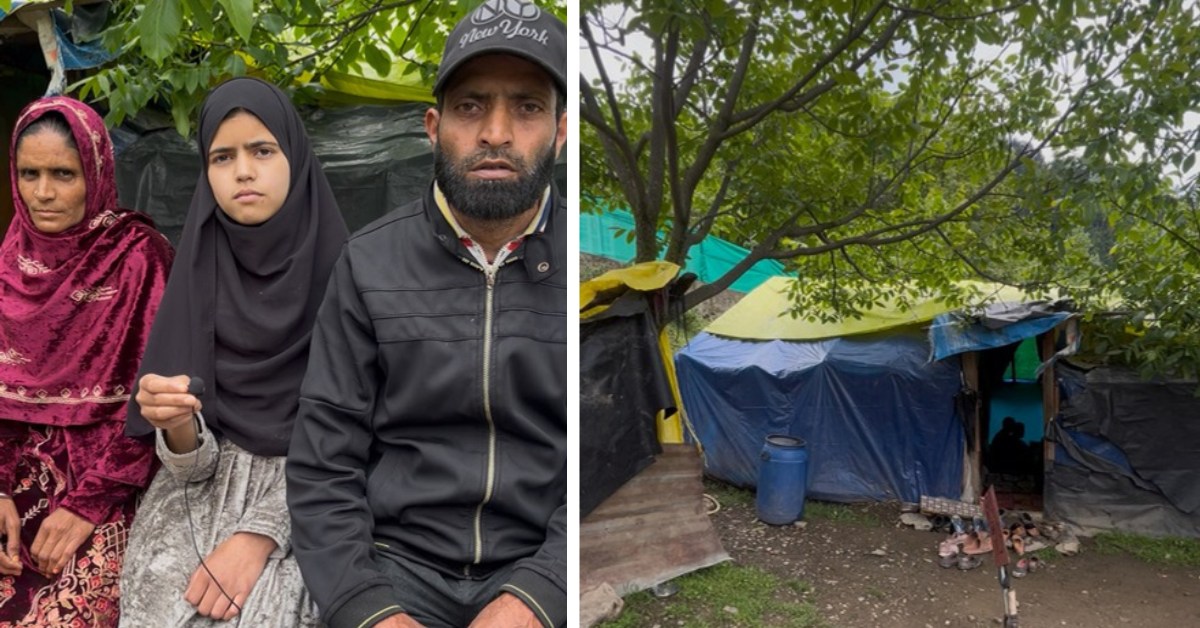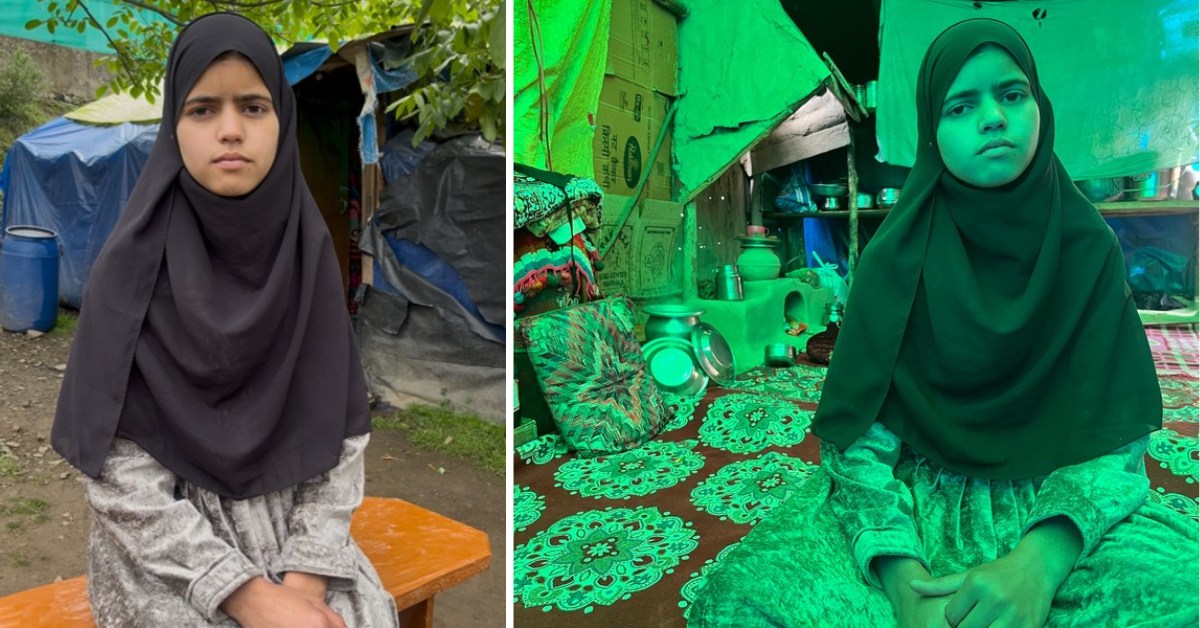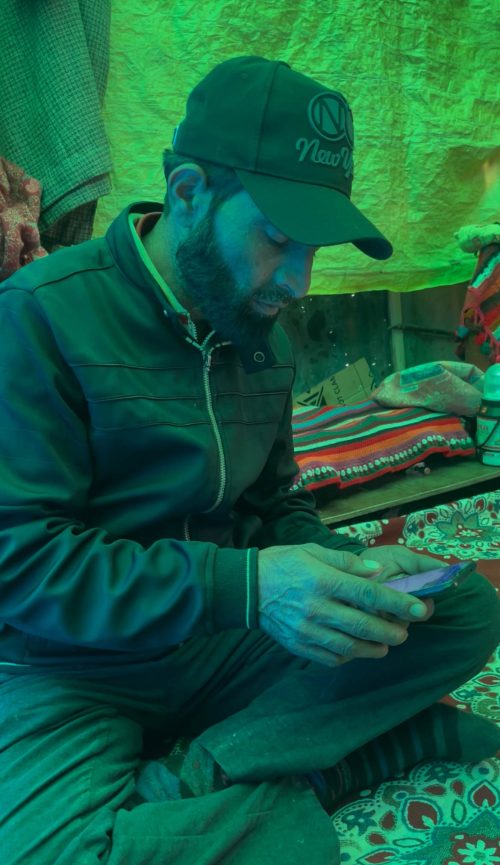Kashmir’s Tribal Girl Who Grew up in a Tent Defies Family Struggles & Scores 92% in Class 12
Written by Irfan Amin Malik
It’s not often that a tarpaulin-covered tent in a remote Kashmiri hamlet becomes the centre of celebration. But this month, in Kathwad village in Tral, 17-year-old Shabnam Sadiq gave her family and community something to gather around — hope. Scoring an impressive 92 percent in her Class 12 Arts stream, Shabnam did what few around her imagined possible.
Growing up in a nomadic Gujjar family, her days were shaped by livestock migrations, economic struggle, and a deep-rooted belief that education, though important, was often out of reach. With no steady electricity, no digital access, and no coaching classes to fall back on, her learning was built on sheer consistency, willpower, and the small, everyday support of a family that backed her quietly but firmly.
Shabnam’s story isn’t dramatic — it’s deeply human. It reflects what’s possible when a young girl chooses to bet on herself, when a community dares to dream through her, and when success doesn’t just break barriers, but gently shifts what the next generation believes is within reach.
A dream born under tarpaulin
“With no roads in our hamlet, no permanent home, and limited financial resources, I have worked hard to study and achieve as many marks as possible, because education is my passion,” the 17-year-old girl tells The Better India, speaking with quiet confidence from the modest tent she studies in.
For years, Sadiq has walked miles each day to reach school, often uphill, carrying the weight of her dreams heavier than the books in her bag. “I used to walk nearly a kilometre just to reach the main road and find a bus. On some days, there was no bus at all, and I would walk the entire six kilometres to school,” she adds.
 Shabnam Sadiq, 17, studied in this Pulwama tent without electricity or coaching — and scored 92% in Class 12 with her parents’ support.
Shabnam Sadiq, 17, studied in this Pulwama tent without electricity or coaching — and scored 92% in Class 12 with her parents’ support.
Sadiq’s hardships did not end with the absence of roads or reliable transport to reach school. For example, she recalls how, during the winter months, heavy snowfall would completely cut off her village, leaving her isolated. “There was no one to help. I had only my textbooks and whatever I could understand on my own. But now that I have passed my Class 12 exams, my next goal is to pursue graduation and begin preparing for the Union Public Service Commission (UPSC) exam to become an Indian Administrative Service (IAS) officer.”
Sadiq’s school principal, Nazir Ahmad of Government Girls Higher Secondary School Tral, speaks highly of her character and dedication. He describes her as an intelligent, hardworking, and punctual student who, despite facing numerous challenges, excelled in her studies. Her ability to overcome such difficulties and achieve such impressive results has made her an inspiration to both her teachers and peers.
“We are extremely proud of Sadiq. Studying from a tent covered with plastic and with limited resources, she still secured an impressive 463 out of 500 marks. She has set an example for the entire Kashmir Valley and inspires many students,” Ahmad tells The Better India.
A teenager from Pulwama, a blue tent, and a big dream
For most of her life, Sadiq has studied under the constant shadow of uncertainty—no stable roof, no private space, no proper washroom, and electricity that came and went as it pleased. Her family lives in a cramped tent in a remote part of Pulwama, where survival itself is a full-time job. And yet, through it all, Sadiq held on to a dream: to become an IAS officer and serve people who’ve been ignored for generations — especially her own Gujjar community.
Kashmir’s Gujjars, who make up 11.9 percent of Jammu & Kashmir’s population, are among the region’s most overlooked. While they were granted Scheduled Tribe status in 1991, decades of political neglect, isolation, and poor infrastructure have kept many of them locked out of opportunities.
 Cut off by snowfall, studying alone in a tent, Shabnam relied only on her textbooks.
Cut off by snowfall, studying alone in a tent, Shabnam relied only on her textbooks.
In remote belts like Tral and Rajouri, where many Gujjars live in makeshift shelters or migrate seasonally with their livestock, even basic services like electricity, healthcare, and education are hard to come by. Most children walk miles to reach a government school, and girls often drop out due to the lack of safety, toilets, or simply the burden of daily survival.
Despite these odds, Sadiq found a way to stay focused. Her story isn’t about defying the odds — it’s about never having a single advantage and showing up anyway.
A father’s faith in his daughter pays off
Her father, Mohammad Sadiq Bokda, a 40-year-old daily wage labourer, dropped out of school in the 9th grade. But that experience stayed with him — it shaped his deepest desire: to make sure his children had a shot at a better life.
“I am a school dropout, and I know what it means to miss out on an education. Even without a home, I never lost the courage to support my children’s studies. I am hopeful that my daughter, who has done so well in her exams, will prove her mettle in the years to come and secure a good job,” he says with a quiet smile, pride written all over his tired face.
The day the results came in, he was far away, working as a labourer. But when the call came, he dropped everything and rushed back home. “The moment I heard the news, I was over the moon. I just wanted to see her face and tell her that she has made us all so proud.”
 Mohammad Sadiq Bokda, a daily wage labourer, never finished school — but made sure his daughter never gave up on hers.
Mohammad Sadiq Bokda, a daily wage labourer, never finished school — but made sure his daughter never gave up on hers.
Back home, the tent was no longer just a shelter — it had become a symbol of hope. Relatives and neighbours poured in to celebrate. Sadiq’s mother, Karamat Jan, shyly served tea to the visitors. She didn’t speak much, but her face said it all. “I never imagined I would see a day like this, with my tent becoming a centre of joy and filled with people,” she says softly. “All my sorrows and pain have faded after my daughter’s success in the exams.”
Sadiq’s uncle, Jameel Ahmad Bakerwal, travelled 38 km from Anantnag just to be with her on this day. He wasn’t the only one who came bearing congratulations. District Development Commissioner of Pulwama, Basharat Qayoom, also honoured her achievement with a cash award of ₹50,000 and a formal felicitation.
Sadiq draws strength from those who have walked this path before her. She names Dr Sehrish Asgar—Kashmir’s first woman to top the KAS (Kashmir Administrative Services) exam in 2011 — and Seerat Baji from Kanthol village, who cracked the IAS in 2023, as her inspirations.
Her father hopes the attention her success has brought to their remote village will finally push the government to act. “Maybe now they will fix the road or give us proper electricity,” he says. “It’ll make things a little easier for the next child who wants to study.”
Edited by Leila Badyari
News